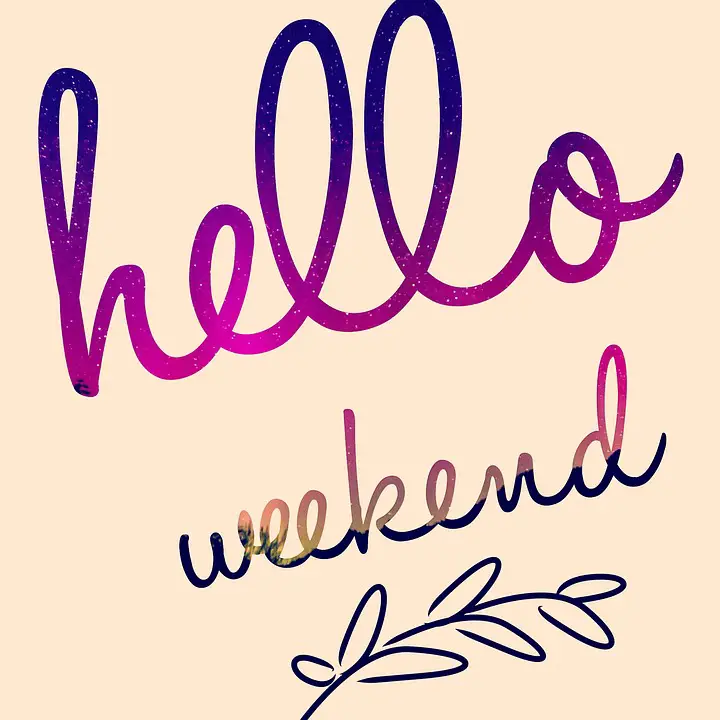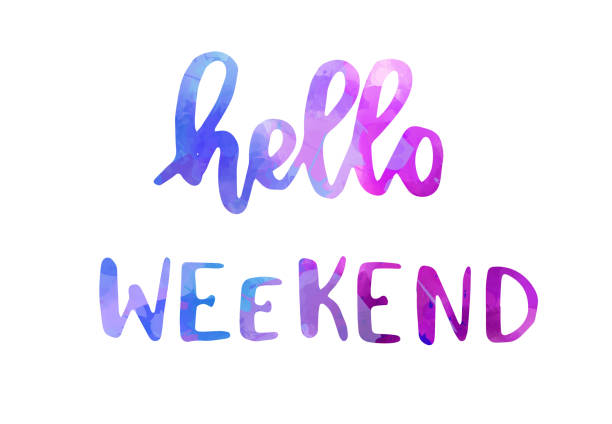The Weekend: Shut The Fuck Up About Its Confusing Rules!
It's almost like the term "the weekend" has a mind of its own, doesn't it? For so many of us, that phrase, which should signal a time of rest and ease, sometimes brings a bit of a headache. You know, the kind where you're just trying to figure out what someone actually means when they say, "by the weekend." Is that Friday night? Is it Sunday evening? It's really, really enough to make you want to tell the whole concept to, well, just be clear for once.
This isn't just a minor annoyance, apparently. The way we talk about our days off, or even the days leading up to them, can create genuine misunderstandings. What one person thinks of as the start of their free time, another sees as the very end of it. It's like we're all speaking slightly different languages, even though we're using the same words, you know?
So, we're going to get a handle on this linguistic puzzle. We'll look at why "the weekend" can be such a tricky phrase, explore some common ways people use it, and perhaps, just perhaps, find a bit of peace in its often-muddled definitions. It's time to bring some real clarity to a concept that, frankly, tends to be more complicated than it needs to be.
- Unveiling The Riches Madisyn Shipmans Net Worth Explored
- Unveiling The Secrets Of Sb19 Before Surgery Discoveries And Insights That Will Transform Your Surgical Journey
- Unraveling The Intriguing Story Of Elaine Scottos Husband
- Unveil The Hidden Uncover The Untold Truths That Will Reshape Your World
- Unveiling The Legacy Of Rodolfo Mrquez A Journey Into Mexican Art
Table of Contents
- What Makes "The Weekend" So Tricky?
- Past, Present, or Future: Getting Your Weekends Straight
- The Origins of Our Two-Day Break
- Making Sense of "The Weekend": Practical Tips
- Frequently Asked Questions About The Weekend
- Embracing Clarity for a Calmer Weekend
What Makes "The Weekend" So Tricky?
You might think "the weekend" is a simple idea: Saturday and Sunday. But, as a matter of fact, it's not always that straightforward. There are nuances, little twists in how we use the term that can really throw a wrench in things. For example, think about how different people define the start and end points of this special time.
"By the Weekend" vs. "At/On the Weekend"
This is where a lot of the confusion, honestly, starts. When someone says, "I need that report by the weekend," what do they really mean? Typically, that phrase, "by the weekend," points to a deadline that's before Friday midnight. It's about finishing something before the leisure time truly begins. It's a clear cut-off point, more or less.
Now, compare that to saying, "I'll see you at the weekend" or "We're going away on the weekend." These phrases, you know, refer to events happening *during* the weekend itself, whether it's in the past or coming up soon. "At/on the weekend" is about the activity within those days, not a deadline before them. So, you can see, the little words make a big difference.
- Unlocking The Secrets Is Scottie Scheffler Married
- Unveiling Norah Jones Rich Tapestry Of Heritage
- Scottie Schefflers Wifes Pregnancy Exclusive Revelations And Untold Stories
- Jenna Lyons Height Surprising Truths And Fashion Revelations
- Dark Hair With Highlights
Is Sunday the First or Last Day?
Here's another point of debate that, in a way, causes some head-scratching. For some folks, Sunday is considered the first day of the week. This means that for them, the weekend wraps up the week, with Saturday being the last day. But for others, Sunday is the last day, completing the week before Monday starts a new one. This distinction, you know, can really shift how someone thinks about their schedule.
It's a regional thing, too, in some respects. Different calendars and cultural norms influence whether Sunday kicks off the week or brings it to a close. This subtle difference, frankly, means that when you talk about "the weekend," you might be picturing something a little bit different from the person you're speaking with.
The Plural Weekend: "On the Weekends"
In places like Southern California, you might often hear people say "on the weekends." This usage, where "weekend" is plural, refers to a recurring habit or something that happens generally during any weekend. For example, "I usually go hiking on the weekends." This is, you know, perfectly proper English and is quite common in many parts of the world, not just a regional quirk.
This is different from saying "on the weekend" (singular), which typically refers to a specific, upcoming, or recent weekend. So, "I'm going hiking on the weekend" means *this* weekend, whereas "I go hiking on the weekends" implies a regular activity. It's a small change, but it really clarifies the frequency of an action.
Past, Present, or Future: Getting Your Weekends Straight
One of the biggest sources of confusion, honestly, comes from not knowing if someone is talking about a weekend that's already happened, one that's happening now, or one that's yet to come. To avoid any mix-ups, it's really helpful to be super clear. For example, if you're talking about something that happened, you might say "this past weekend" or "last weekend."
Are "this past weekend" and "last weekend" the same thing? Yes, generally speaking, they are used interchangeably to refer to the weekend that just finished. So, if today is Tuesday, "this past weekend" means Saturday and Sunday that just went by. Similarly, "last weekend" refers to the exact same period. It's good to know, you know, that these phrases pretty much mean the same thing.
When you're looking ahead, you'd say "this coming weekend" or just "this weekend" if the context is clear. For example, "I'm going to the beach this weekend" means the one that's about to happen. Being precise with these time markers can, in a way, save a lot of head-scratching later on. It's about setting clear expectations for everyone involved.
The Origins of Our Two-Day Break
The idea of "the weekend" as we largely know it today, with most people not working on both Saturday and Sunday, is actually a pretty modern concept. It's very much a U.S. invention that spread globally. Before this, work schedules were often much longer, with fewer defined breaks. This structure, you know, was a big shift for society.
The practice of having Saturday and Sunday off really took hold in the early 20th century. It was a gradual change, driven by various factors including labor movements and the desire for more leisure time. This standardized break, you see, made planning social activities and family time much easier for a lot of people. It fundamentally reshaped how we live our lives, more or less.
Sometimes, this period can even stretch a bit. If it's a holiday weekend, then Monday might, apparently, get counted as part of the long weekend. But usually, "the weekend" just means Saturday and Sunday. This extension for holidays is a nice bonus, of course, but it's important to remember the core definition remains those two days.
Making Sense of "The Weekend": Practical Tips
Given all this potential for confusion, how can we make sure we're all on the same page when we talk about "the weekend"? It really comes down to being a bit more specific in our language. Don't assume everyone shares your exact definition. For instance, if you're setting a deadline, say "by Friday evening" instead of "by the weekend."
When you're making plans, adding a specific date or clarifying "this coming weekend" can really help. So, instead of "Let's meet on the weekend," try "Let's meet this coming weekend, maybe Saturday the 13th?" This just takes away all the guesswork, you know, and makes sure everyone is thinking about the same days. It's a simple change, but very effective.
Also, if you're asking about something that happened, try to use phrases like "this past weekend" or "last weekend" consistently. This helps avoid any ambiguity about which weekend you're referring to. It's about being direct and clear, which, frankly, makes communication a lot smoother for everyone involved. It's just a little bit of effort for a lot of clarity.
Learn more about time expressions on our site, and link to this page for more grammar tips for clarity.
Frequently Asked Questions About The Weekend
Is 'this past weekend' the same as 'last weekend'?
Yes, actually, "this past weekend" and "last weekend" are generally used to mean the same thing. They both refer to the weekend that just finished. So, if today is Wednesday, both phrases would point to the Saturday and Sunday that just went by. It's pretty much interchangeable.
Can 'on the weekends' be used for plural, and is it proper English?
Absolutely, "on the weekends" is perfectly proper English, and it's commonly heard, especially in places like Southern California. It refers to something that happens regularly or habitually during weekends, as in "I often visit my family on the weekends." It's a very normal way to talk about recurring events.
When referring to 'a weekend,' do I need 'a' or 'the' in front of the word weekend?
It really depends on what you're trying to say. If you're talking about a general, unspecified weekend, you might use "a," like "I need a weekend off." If you're talking about a specific weekend, either one coming up or one that just passed, you'd use "the," as in "I'm looking forward to the weekend" or "The last weekend was great." So, it's about whether you're being general or specific.
Embracing Clarity for a Calmer Weekend
So, the next time you find yourself wondering what someone means by "the weekend," remember all these little nuances. It's clear that this seemingly simple term holds a lot of potential for misinterpretation. By being a bit more precise in our own language, and perhaps asking for clarification when needed, we can, you know, make things a whole lot smoother.
It's about making sure everyone is on the same page, whether you're talking about a deadline, a past event, or future plans. This little bit of effort can really cut down on confusion and help us all enjoy our actual free time without any unnecessary linguistic headaches. Let's just make "the weekend" clear, for goodness sake! You can learn more about the definition of weekend and its usage.
- Andrew Kojis Wife Uncovering The Hidden Truth
- Discover The Untold Story Of Gymnastics Legend Olga Korbut
- Unlocking The Mysteries Of Dear Lord When I Get To Heaven
- Unveiling The Enigmatic Wicked Witch Of The East Discoveries And Insights
- Aaron Earned An Iron Urn

Best 22 Innovative Weekend Business Ideas - 99BusinessIdeas

Five Home Improvements You Can Finish in a Weekend — Home Remodeling

4,000+ Hello Weekend Stock Illustrations, Royalty-Free Vector Graphics